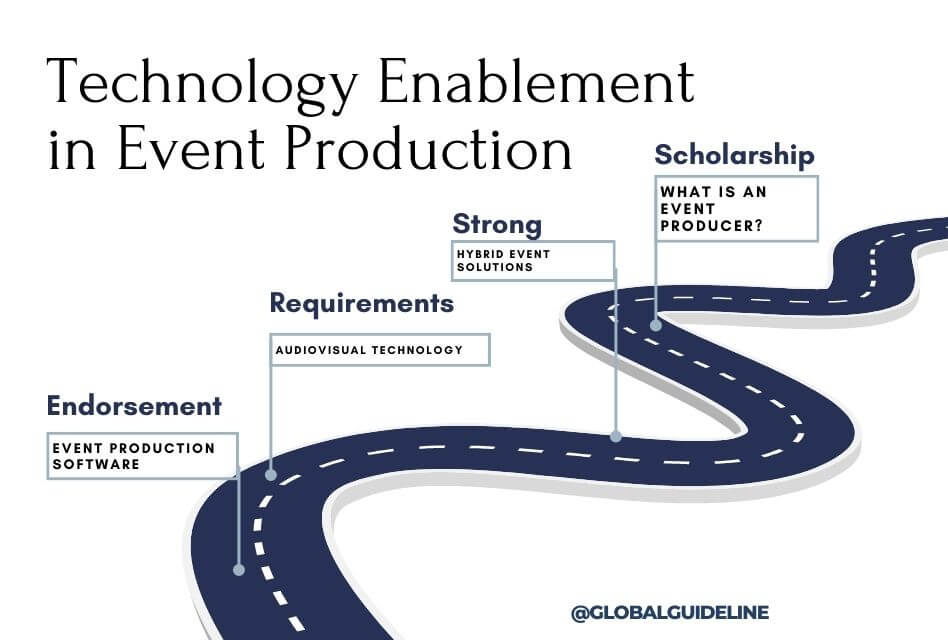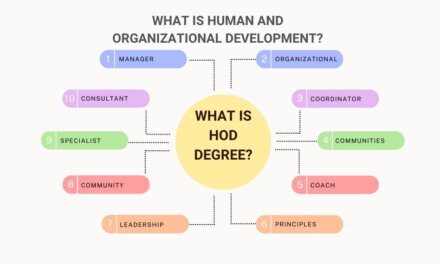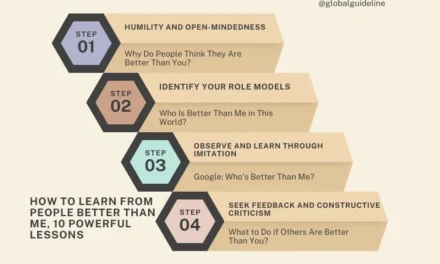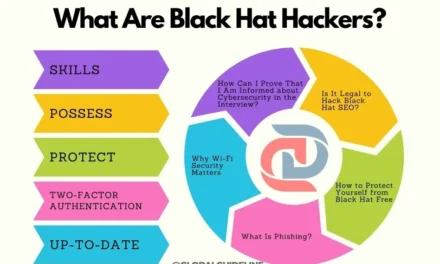Event production is a field that is more dynamic and complex than others because it requires planning and coordinated action, hence good execution. Whether it is corporate, concert, or wedding production, all events need both creative thinking and logistical and real-time on-spot problem-solving to be successful. In this article, we’ll take a close look at the top five secrets to mastering event production and how to ensure smooth events from start to finish.
Table of Contents
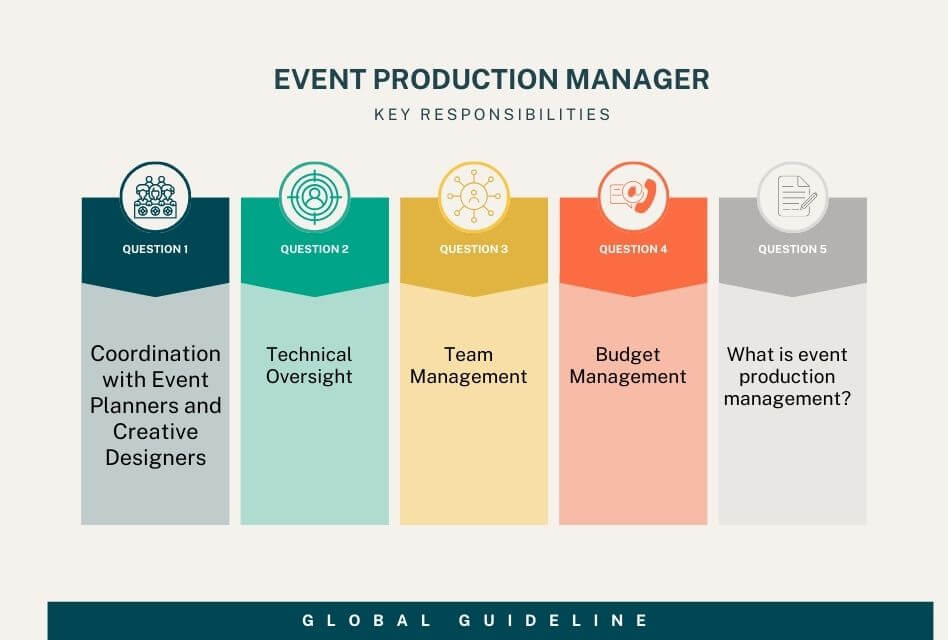
1. The Nature of the Event Production Role
Before we discuss the detail, we need to know what event production is. Most of the literature and the practitioners mistakenly confuse event production with event planning. In fact, event planning and event production are two different functions in the event business.
- Event Production vs. Event Planning: Thus, event planning focuses on the central thought or theme of the event and every nitty-gritty involved in executing it, whether it is venue booking and eventually, coordination of vendors. On the other hand, event production would mean that is the translation of the plan into life, to wit, technical elements including lighting, sound, staging, audiovisual, among others.
- Role of Event Production: Event production entails all elements pertaining to the setup of equipment and staging of an event on the actual day. The event production manager oversees this process and communicates with other teams involved to ensure the event smoothly proceeds as expected.
What is an event production manager?
An event production manager is responsible for the technical side of the event and makes sure that every audiovisual, staging, and logistical element will run perfect.
This understanding will shed light on what exactly is expected to be involved in the process of putting together an event and what competencies are necessary to get it right.
2. The Process of Event Production: From Concept to Execution
An event production process refers to the systematic manner through which an event transforms from its concept to reality. Various events demand detailed consideration and coordination with many stakeholders.
- Initial Consultation and Concept Development: The first process of an event production is where an initial consultation with the client in mind to develop a concept that fits the goals of the client.
- Planning and Coordinating: When the concept is fixed, it goes to its planning. It involved setting up the certain timelines, coordinating the vendors, permitting, as well as a source organization.
- Pre-Event Preparation: In the case of the weeks leading up to the event, the production team will finalize all technical details. These would set up lighting, sound systems, or staging. Planning in this stage is very essential as it has to ensure everything is all arranged before the event day.
- Day-of-Event Execution: On the day of the event, production personnel come in early to set up and conduct final checks. Every detail of the event will shine and be geared up so that nothing goes wrong at the event.
- Post-Event Review: After the actual event, the production team deems it fit and necessary to hold a debrief to figure out what went right, and what should be improved. Feedback is very critical in perfecting future event production processes.
What is the process of event production?
Concept development, planning, preparation before the day of the event, execution on the actual day of the event, and review after the event are some of the processes of event production.
Following a structured process allows event production teams to ensure complex events are managed effectively to produce an excellent outcome.
3. Key Responsibilities of an Event Production Manager
An event production manager can be described as the most crucial element required to ensure any event comes into existence. As such, this role entails depth in knowledge concerning creativity and logistics related to event production.
- Coordination with Event Planners and Creative Designers: The production manager collaborates with event planners and creative designers by holding meetings to align the goals and coordinate their efforts on realizing an event’s vision.
- Technical Oversight: The production manager has oversight of all technical aspects of an event, including lighting, sound, and staging. They ensure all the equipment is in perfect working order and address and correct any technical defects immediately.
- Team Management: The other critical responsibility is coordinating the event production team. It entails assigning every role, managing the schedules, and people must work in unity.
- Budget Management: As crucial as the creative elements of an event, a production manager must also ensure that the event does not go over budget. It entails making choices that are budget-friendly yet do not impact the outcome in any way.
What is event production management?
Event production management, in this context, means being in charge of the technical and logistical aspects of an event so that everything goes off without a hitch and according to budget.
A savvy event production manager is the difference between getting the job done right and fluke. They need a balance between creative vision and practicalities to achieve the desired end result.
4. Technology Enablement in Event Production
It is crucial in any digital age to employ technology in event production. Technology can profoundly make the process much more efficient and effective in event production-from planning software to real-time communication tools.
- Event Production Software: This includes Event Production software. Its utilization will sharply streamline all the processings involving planning and coordination on the production team and great application of its use in any production. Its tools will allow them to manage timelines, track budgets, and communicate with vendors in real-time.
- Audiovisual Technology: The objective of quality, state-of-the-art audiovisual equipment during such an event is to provide immersion. That encompasses audio elements-including the equipment and lighting rigs-and video screens, projection mapping, or any other multimedia-related element.
- Hybrid Event Solutions: Hybrid events can allow for in-person or virtual attendees, which forces the bar higher on technology usage in both the production and management teams. These teams need to be hybrids-themselves-for the most part, handling the live parts but digital in terms of their management of the virtual audience, making it easy to interface with all the attendees of the event.
What is an event producer?
An event producer is in charge of the entire production process related to an event. Creativity, technicality, and all logistical issues are handled by them. They will interact with clients and other teams involved in production to create a spectacle around the event in question.
Latest technology allows event production teams to connect with event attendees better and ensure that the events occur flawlessly from start to end.
5. Successful Event Ensuring: Tips for Event Producers
Producing an event requires such careful planning, good communication, and flexibility to deal with the unexpected challenges. Some guidelines from the producers of the event guarantee success:
- Start with a Clear Vision: Logistic considerations of an event should already have been visualized in planning at the very start – even before thinking of the logistics.
- Communicate: This entails carrying out continuous consultation with the client, event organizers, and other production teams to ensure that all parties are updated on the plan and every eventuality.
- Prepare for eventualities: There will certainly be unplanned events no matter how good one’s skills in planning might be. The existence of contingency plans for possible problems like equipment failures or weather intermission helps to respond fast in any case.
- Focus on the Attendee Experience: Finally, Attendee Experience-the bottom line is what counts in events-that is, the attendee experience. Ensure that every aspect of the event, from audiovisual elements to activity flow, is based on attendee-centricity.
- Review and Reflect: Review and Reflect On after the event, review what went right, what did not, and what has to be improved. That is crucial for continuous improvement and further success.
What is the difference between event planning and event production?
Event planning usually zooms in on the logistics and concept of an event-booking venues, coordinating vendor sources, etc. Events that fall in the realm of production would include the execution of the technical aspects-lighting, sound, staging, etc.
These tips may help to produce events that will leave a memorable and impactful impression for the client’s objectives and delight audiences.
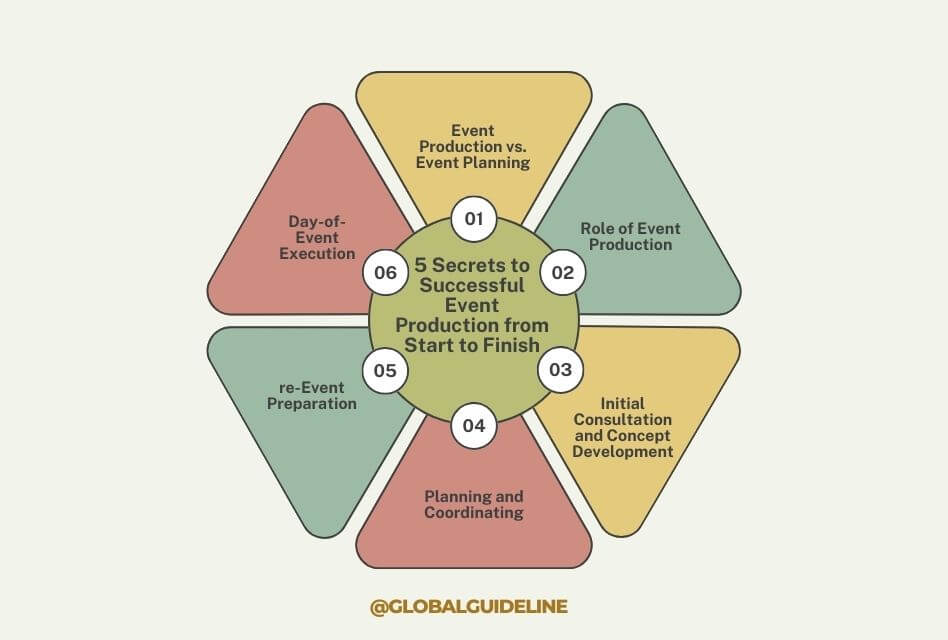
Preparing for an Event Production Job Interview
Do you want to find a job in event production? Then, it’s time to prepare for the interview. Here are some common questions and tips on how to answer them:
- “What experience do you have in event production?”
Speak about your experience in handling technical aspects of events, creative teams, and from start to finish. - “What happens when something doesn’t go to plan on site during an event?”
Talk about your ability to problem-solve, keep a cool head under pressure, and share examples or scenarios that have challenged your ability to manage so far. - “What is the role of technology in your overall event production process?”.
Emphasize your proficiency with event production software, AV technology, and hybrid event solutions, explaining how you use these tools to enhance the event experience. - “Why do you want to work in event production?”
Tell them of your passion for an outstanding event, highlighting the attention to detail and bringing your creative visions to life with technical expertise.
These questions help your employer identify whether you suit an event production role and will be able to contribute to successful events.
Frequently Asked Questions
Q1: What are the processes of event production?
Event production processes include conceptualization, planning, pre-event preparation, day-of execution, and post-event review.
Q2: What does an event production manager do?
An event production manager is concerned with the technical and logistical aspect of an event, as all elements are executed according to plan and within budget.
Q3: What is the role of event production?
Technical management for an event plan would bring it alive by managing every technical aspect such as lighting and sound along with staging. This management will ensure that the entire event runs well from the beginning till the end.
Q4. What is called Event Production Management?
Event production management refers to the oversight of executing all technical and logistical aspects of an event, team coordination, and ensuring its successful delivery.
Q5: What is the difference between event planning and event production?
Event planning would be more about getting together all those conceptual and logistical parts of the event. Event production focuses more on technical implementation.
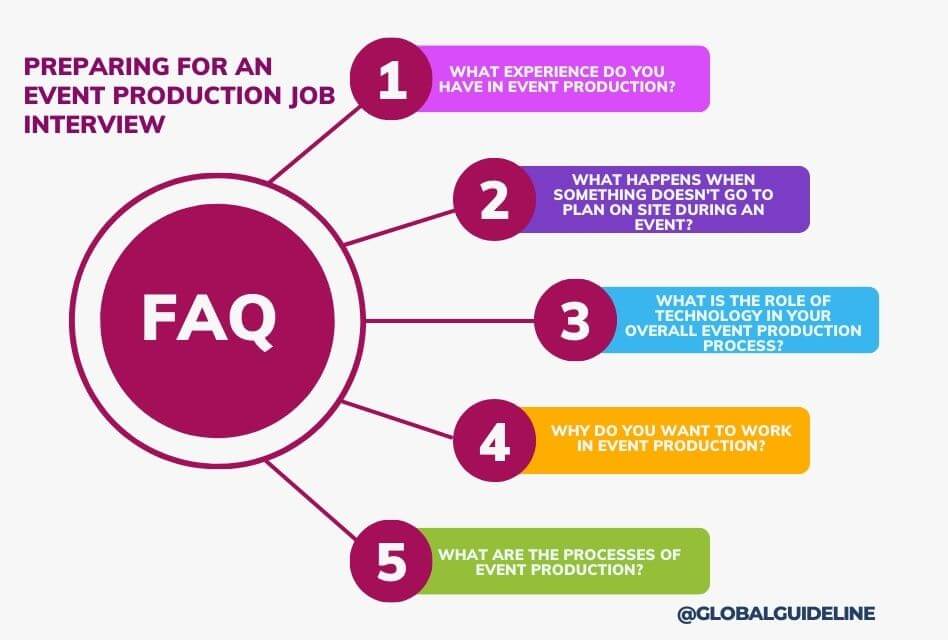
Conclusion
Event production refers to the organization of a specific event. This blend of technical aspect, creativity, and meticulous planning will contribute to a flawless event production process. Understanding the function of the event production process and having a structured process with technology, the event producers are able to make sure that an event flows with minimal problems from start to finish. If you are an experienced professional or a beginner in
Related Posts:
7 Characteristics of a Great Guy for a Lasting Relationship
How to Protect Yourself from Black Hat: 10 Essential Tips USA
Special Events Fundraising Manager Interview Questions & Answers

